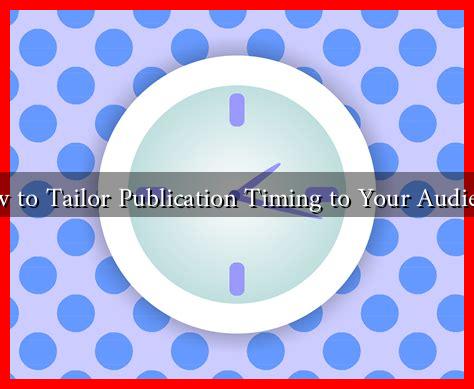-
Table of Contents
How to Tailor Publication Timing to Your Audience
In the fast-paced world of content creation, timing can be just as crucial as the content itself. Understanding when to publish your work can significantly impact its reach and engagement. This article explores how to tailor publication timing to your audience, ensuring that your content resonates and achieves its intended goals.
Understanding Your Audience
The first step in tailoring publication timing is to have a deep understanding of your audience. This involves analyzing their behaviors, preferences, and the platforms they frequent. Here are some key factors to consider:
- Demographics: Age, gender, location, and occupation can influence when your audience is most active online.
- Psychographics: Interests, values, and lifestyles can dictate the type of content they engage with and when.
- Behavioral Patterns: Understanding when your audience is most likely to consume content can help you choose optimal publication times.
For instance, a study by HubSpot found that the best times to post on social media vary by platform. For example, the ideal time to post on Facebook is between 1 PM and 3 PM on weekdays, while Twitter sees higher engagement during lunch hours.
Utilizing Analytics Tools
To effectively tailor your publication timing, leverage analytics tools that provide insights into your audience’s online behavior. Tools such as Google Analytics, Facebook Insights, and Twitter Analytics can help you track:
- Peak Traffic Times: Identify when your audience is most active on your website or social media platforms.
- Engagement Rates: Analyze which posts receive the most likes, shares, and comments, and correlate these with publication times.
- Demographic Insights: Understand the geographic locations of your audience to tailor your timing based on time zones.
For example, if your analytics show that your audience is primarily located in the Eastern Time Zone, but you are publishing at 9 AM Pacific Time, you may be missing out on potential engagement.
Seasonal and Event-Based Timing
Another critical aspect of publication timing is aligning your content with seasonal trends and significant events. This can enhance relevance and engagement. Consider the following:
- Holidays and Seasons: Tailor your content to align with holidays (e.g., Christmas, Thanksgiving) or seasonal changes (e.g., summer vacations).
- Industry Events: Publish content that coincides with industry conferences, product launches, or other relevant events.
- Current Trends: Stay updated on trending topics and news that may resonate with your audience.
For instance, a fashion brand might publish a summer collection lookbook just before the start of summer, capitalizing on seasonal shopping trends.
Testing and Iteration
Once you have a strategy in place, it’s essential to test and iterate. Experiment with different publication times and analyze the results. Here’s how to approach this:
- A/B Testing: Publish similar content at different times and compare engagement metrics.
- Feedback Loops: Encourage audience feedback on when they prefer to receive content.
- Continuous Monitoring: Regularly review analytics to adapt to changing audience behaviors.
For example, Buffer, a social media management tool, regularly tests and updates its posting schedule based on user engagement data, ensuring they remain relevant to their audience.
Conclusion
In conclusion, tailoring publication timing to your audience is a multifaceted approach that requires a deep understanding of your audience, the use of analytics tools, alignment with seasonal trends, and a commitment to testing and iteration. By implementing these strategies, you can enhance your content’s visibility and engagement, ultimately driving better results for your brand or organization.
Remember, the key to successful content publication lies not just in what you say, but when you say it. Stay informed, stay flexible, and always prioritize your audience’s needs.
For more insights on content strategy, consider visiting HubSpot’s Blog.


